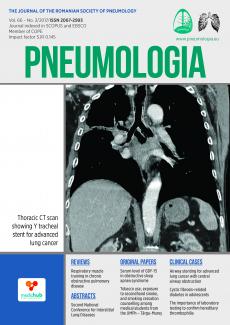General Review
Gastroesophageal reflux and asthma - pathogenetic mechanisms and treatment
Gabriela Jimborean1, Edith Simona Ianosi1, Emese Aberle2, Alexandra Comes2 Contact: Gabriela Jimborean, gjimborean@yahoo.com1. U.M.F. Targu-Mures, Clinica de Pneumologie Targu-Mures; 2. Clinica de Pneumologie, Spitalul Clinic Judetean Mures
ABSTRACT
Gastroesophageal reflux and bronchial asthma are frequently encountered comorbidities that maintain an ambivalent relationship, generating a vicious circle where gastroesophageal reflux increases asthmatic symptoms or precipitates bronchial asthma and asthma can trigger or worsen gastroesophageal reflux disease. Pathogenetic mechanisms of these interrelation are imperfectly understood, despite intense concerns of specialists in both areas. There have been incriminated: eso-bronchial constrictor vagal mediated reflexes, bronchial hyperreactivity, neurogenic inflammation induced by hydrochloric acid penetration in the oesofagus, airways hydrochloric acid microaspiration with asthmatic trigger effects, increased bronchial resistance or increased immune response to antigens. Bronchial obstruction and some antiasthmatic medication can decrease lower esophageal sphincter pressure and thus triggering or aggravating gastroesophageal reflux. The diagnosis of the gastroesophageal reflux in asthmatics involves a careful clinical exam, digestive functional test (up to 24 hours monitoring esophageal pH) and esogastroscopy. Gastroesophageal reflux treatment in asthmatic patients claims elimination of both disease risk factors, diet, proton-pump inhibitors.
Keywords: Gastroesophageal reflux, asthma, esophageal 24 hours pH monitoring, antireflux therapy




 Gastroesophageal reflux and asthma - pathogenetic mechanisms and treatment No. 1/2012
Gastroesophageal reflux and asthma - pathogenetic mechanisms and treatment No. 1/2012